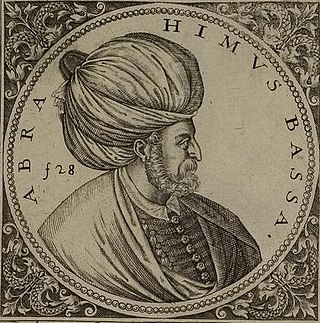Pargalı Ibrahim Pasha
Grand Vizier of the Ottoman Empire from 1523 to 1536 From Wikipedia, the free encyclopedia
Pargalı Ibrahim Pasha[a] (c. 1495–5 March 1536), was the first Grand Vizier of the Ottoman Empire appointed by Sultan Suleiman the Magnificent.
Ibrahim | |
|---|---|
 Engraving of Ibrahim Pasha | |
| 28th Grand Vizier of the Ottoman Empire | |
| In office 27 June 1523 – 5 March 1536 | |
| Monarch | Suleiman I |
| Preceded by | Piri Mehmed Pasha |
| Succeeded by | Ayas Mehmed Pasha |
| Ottoman Governor of Egypt | |
| In office 1525–1525 | |
| Monarch | Suleiman I |
| Preceded by | Güzelce Kasım Pasha |
| Succeeded by | Güzelce Kasım Pasha |
| Personal details | |
| Born | c. 1495 Parga, Republic of Venice |
| Died | 5 March 1536 (aged 40–41) Constantinople, Ottoman Empire |
| Nationality | Ottoman |
| Spouse | Muhsine Hatun[1] |
| Children | Mehmed Şah Bey |
Ibrahim, born as Orthodox Christian, was enslaved during his youth. He and Suleiman became close friends in their youth. In 1523, Suleiman appointed Ibrahim as grand vizier to replace Piri Mehmed Pasha, who had been appointed in 1518 by Suleiman's father, the preceding Sultan Selim I. Ibrahim remained in office for the next 13 years. He attained a level of authority and influence rivaled by only a handful of other grand viziers of the Empire, but in 1536, he was executed on Suleiman's orders and his property (much of which was gifted to him by the Sultan) was confiscated by the state.
Biography
Summarize
Perspective
Origin
Ibrahim was born to Orthodox Christian parents in Parga, Epirus, then part of the Republic of Venice. His ethnicity is unknown, but he probably originally spoke a Slavic dialect and also knew Greek and Albanian. His father was either a sailor or a fisherman.[2] Some time between 1499 and 1502, during the Ottoman–Venetian War, he was captured in a raid by Iskender Pasha, the Ottoman governor of Bosnia, and became a slave. He first met Prince Suleiman while residing at Iskender Pasha's estate near Edirne, most likely in 1514. It was then that he was taken into Suleiman's service.[3]
Political career
After his rival Hain Ahmed Pasha, the governor of Egypt, declared himself independent of the Ottoman Empire and was executed in 1524, Ibrahim Pasha traveled south to Egypt in 1525 and reformed the Egyptian provincial civil and military administration system. He promulgated an edict, the Kanunname, outlining his system.[4][5]
In a lavish ceremony in 1523, Ibrahim Pasha was married to Muhsine Hatun, the granddaughter of the same Iskender Pasha who had captured him more than two decades previously. This marriage appears to have been politically motivated as a method of integrating Ibrahim, an outsider, into the Ottoman elite. While Muhsine was initially skeptical about her new husband, they eventually formed a loving relationship. Although historians once believed that the woman Ibrahim married was Hatice Sultan, the sister of Sultan Suleiman, this had been based on scanty evidence and conjecture. As a result of research carried out by the historian Ebru Turan, including the discovery of multiple references to Muhsine in Venetian and Ottoman texts as well as a signed letter from her to Ibrahim, it is now accepted that Ibrahim's wife was Muhsine and not Hatice. They had at least one child, a son named Mehmed Şah Bey (dead in 1539).[1]

His palace, which still stands on the west side of the Hippodrome in Istanbul, has been converted into the modern-day Turkish and Islamic Arts Museum.

On the diplomatic front, Ibrahim's work with Western Christendom was a complete success. Portraying himself as "the real power behind the Ottoman Empire", Ibrahim used a variety of tactics to negotiate favorable deals with the leaders of the Catholic powers. The Venetian diplomats even referred to him as "Ibrahim the Magnificent",[6] a play on Suleiman's usual sobriquet. In 1533, he convinced Charles V to turn Hungary into an Ottoman vassal state. In 1535, he completed a monumental agreement with Francis I that gave France favorable trade rights within the Ottoman Empire in exchange for joint action against the Habsburgs. This agreement would set the stage for joint Franco-Ottoman naval maneuvers, including the basing of the Ottoman fleet in southern France (in Toulon) during the winter of 1543–1544.
Although Ibrahim Pasha had long since converted to Islam, he maintained some ties to his roots, even bringing his parents to live with him in the Ottoman capital, where they also converted to Islam. His father took the name Yusuf and joined the Ottoman elite, becoming a governor in Epirus.[7]
As he attained increasing wealth and power, he also attained enemies; such as the famous Hürrem. After a dinner with the Sultan on 5 March 1536, Ibrahim Pasha went to bed. Upon arrival to his room, he was seized, and killed. Thus, Hürrem became the chief political advisor to her husband, the Sultan.[8][9]
In popular media
- In the internationally popular Turkish television series Muhteşem Yüzyıl, Pargalı Ibrahim Pasha is portrayed by actor Okan Yalabık.
- He appears as a unique Ottoman governor in the video game Civilization 6 in the Gathering Storm expansion.
See also
- Turkish and Islamic Arts Museum, formerly Pargalı Ibrahim Pasha's palace
- List of Ottoman grand viziers
- List of Ottoman governors of Egypt
Notes
- also known as Frenk Ibrahim Pasha ("the Westerner"), Makbul Ibrahim Pasha ("the Favorite"), which later changed to Maktul Ibrahim Pasha ("the Executed") after his execution in the Topkapı Palace.
References
Bibliography
Wikiwand - on
Seamless Wikipedia browsing. On steroids.
